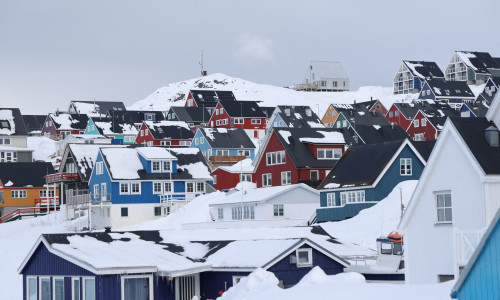
Exclusive-US weighs special status for Greenland as quest for island intensifies
By Gram Slattery, Valerie Volcovici and Steve Holland
WASHINGTON (Reuters) – U.S. officials are discussing a plan to pull Greenland into America’s sphere of influence using a type of agreement that the United States has used to keep close ties with several Pacific Island nations, according to two U.S. officials and another person familiar with the discussions.
Under the plan being considered, the Trump administration would propose to Greenland’s leaders that the island enter into a so-called Compact of Free Association, or COFA, with the United States.
While the precise details of COFA agreements – which have only ever been extended to the small island nations of Micronesia, the Marshall Islands and Palau – vary depending on the signatory, the U.S. government typically provides many essential services, from mail delivery to emergency management to military protection. In exchange, the U.S. military operates freely in COFA countries and trade with the U.S. is largely duty-free.
President Donald Trump, who during his first administration floated the idea of acquiring Greenland, has pressed even harder since taking office in January, refusing to rule out taking the island by force. Denmark, which governs the island, has sharply rebuffed the idea.
A COFA agreement would stop short of Trump’s ambition to make the island of 57,000 people a part of the U.S. It is not the only Greenland plan on the table, the sources said, and it would face many practical hurdles.
Reuters reported before Trump took office that some advisers had informally suggested the idea. But it has not been previously revealed that White House officials have begun talks about the logistics behind such a proposal.
Some officials at the National Security Council and the National Energy Dominance Council, which Trump established, are involved in the talks, two of the sources said. The National Economic Council is also involved, one of those sources added.
COFA agreements have previously been inked with independent countries, and Greenland would likely need to separate from Denmark for such a plan to proceed. While polls show Greenlanders are interested in independence, surveys also show most do not want to be part of the U.S. A COFA – which cedes significant autonomy to Washington – could be viewed with similar skepticism.
One of those involved in the discussions is Markus Thomi, the acting senior director for the National Security Council’s Western Hemisphere section, according to two of the sources. David Copley, the key mining official on the NEDC, is also involved in the talks, one of those sources said.
The White House did not respond to a request for comment, nor did the Danish Embassy or Greenland’s representative office in Washington.
The Interior Department, which plays a key role in administering COFA agreements through its Office of Insular Affairs, also did not respond.
TROUBLES WITH EXISTING COFA DEALS
Washington’s existing COFA agreements with Palau, the Marshall Islands and Micronesia are seen across the U.S. political spectrum as important for countering China’s growing influence in the Asia Pacific.
Still, such accords have hit snags in the past.
Republican lawmakers have at times opposed elements of the budget allotted to fund COFA agreements, creating deep frustrations in the countries that rely on the funds.
Signing a COFA also offers no guarantee that a nation will be immune from influence operations by U.S. rivals.
In April, Reuters reported that Chinese nationals had successfully cultivated close ties to senior political figures in Palau, alarming U.S. officials.
Danish leaders have not been approached about the COFA idea and have not had any substantive discussions with the White House about Greenland’s future status, one senior European official said. Danish officials have publicly rejected the idea of the U.S. acquiring Greenland, and insist Greenlanders must determine their future.
Administration officials argue the island is crucial to the U.S. due to its deposits of minerals that have important high-tech and military applications, but which remain untapped due to labor shortages, scarce infrastructure and various other challenges.
An administration official told Reuters the U.S. was helping Greenland diversify its economy and gain greater economic independence from Denmark. The Development Finance Corporation and Export-Import Bank, both U.S. agencies, could play a role in that process, the official said.
The official pointed to the Tanbreez Project, which will see rare earths extracted on the island and processed in the U.S., as a particular bright spot in relations with Greenland. New York-based Critical Metals Corp holds a 42% stake in the project, though that stake could increase considerably as part of a complex deal due to be completed later this year.
The official said a COFA “could be an elegant way to address some of the concerns that we have when it comes to Greenland security,” but did not otherwise comment on the possibility of such an accord.
(Reporting by Gram Slattery, Valerie Volcovici and Steve Holland; Editing by Don Durfee and Alistair Bell)

